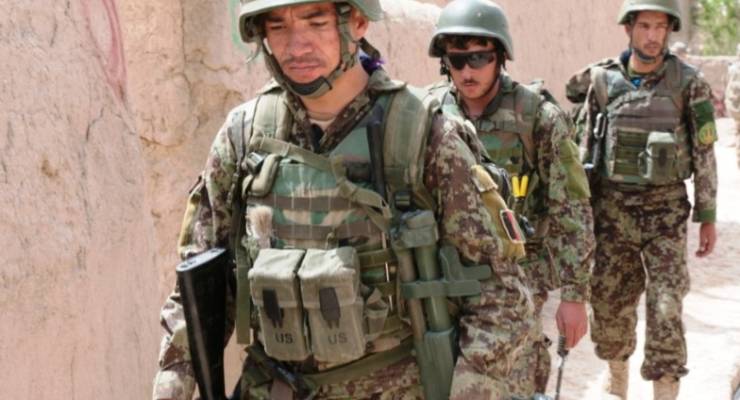
Afghan President Ashraf Ghani’s proposed month-long ceasefire with the country’s Taliban insurgents, to mark the Muslim holiday of Eid al-Adha, is looking like an act of desperation. Regardless of whether it is taken up, or not, the proposed ceasefire is a sign of a government in trouble and grasping at straws.
The proposed ceasefire follows a broadly successful three day ceasefire in June, to mark Islam’s other main holiday, Eid al-Fitr. The government’s announcement of the June ceasefire allowed Taliban fighters to return to their villages, amid scenes of welcome and celebration, including mutual socialising with Afghan soldiers.
Since then, however, Afghanistan’s civil war has escalated, with a string of deadly attacks in the first half of August. Ghani’s offer of a ceasefire was to be from August 20th , for a month, although the Taliban has not yet responded to the offer. A decision by the Taliban’s leadership is thought to be imminent.
The Taliban controls or contests about 70% of Afghanistan and has a presence in most of the rest of it. Government forces are strongest in the centre of the country and in the north, yet earlier this month the Taliban overran and briefly held the central city of Ghazni.
The overrunning of Ghazni sent the message to Afghanistan’s citizens that its government could not protect its own people, even in the “heartland”. The government’s strategy of holding towns, such as it can, also effectively cedes the countryside to the Taliban. The Ghazni attack also sent a message to the growing Islamic State-Khorasan (IS-K) that the Taliban is a force to be reckoned with, following clashes between the two insurgent groups.
There is little doubt that the Taliban would like its fighters to be able to celebrate Eid al-Adha — the Festival of Sacrifice marking the occasion of the willingness of Abraham to sacrifice his son on God’s command. There is also pressure from countries close to the Taliban for it to accept the ceasefire offer.
However, while a short break would be welcome, a month-long ceasefire could see Taliban discipline diminish and many of its fighters returning to domestic life. By contrast, a month-long ceasefire for the government would allow its own troops to celebrate with their communities but also to fortify their positions and replenish their stocks of weapons and supplies. In short, while both sides would welcome a break, a long break would weaken the Taliban and strengthen the government.
Ghani has long been holding out the hope of direct peace talks with the Taliban. A further ceasefire would be seen to build momentum in that direction.
The Taliban, however, has only been interested in such talks from a position of strength. They know that the government cannot win Afghanistan’s civil war, particularly since the government’s ability to control the battle-space dropped sharply following the International Security Assistance Force (ISAF) withdrawal between 2014 and 2016.
There has since been a return of some ISAF troops, but too few to make a difference to the direction of the war. Apart from the military capacity of the Taliban and the frequent unwillingness to fight on the part Afghanistan’s soldiers, the war is being lost by the Kabul government because it lacks legitimacy and genuinely popular support.
The Taliban, by contrast, may only be popular with a minority of Afghans, but they provide certainty in contrast to corrupt and arbitrary administration. The end remains distant, but unless the government can fundamentally reinvent itself, the Taliban will likely secure more ground. Such ceasefires that might be agreed to will only represent a brief pause in the fighting, rather than creating a pathway towards its end.
Damien Kingsbury is professor of international politics at Deakin University.








The Taliban have rejected the proposed extended cease fire, but they have accepted an invitation to attend multi party talks in Russia. Neither Australia nor the US have been invited. Far from being part of the solution, those two nations are seen as part of the problem. Time Australia ceased pretending it has a role and to pack up and leave.
Afghanistan is not a country in the normal sense – the west, Herati are far more sophisticated and look to Iran, though most are sunni.
The vast south is irredeemably pushtu/pathan, utterly and uncompromisingly sunni of an especially unpleasant variety.
The north is yet another country, geographically and ethnically with blood, family, cultural and economic (ha!) ties across the Amu Dara & Hindoo Kush.
Only Kabul functions in a way recognisable by the West and that is a legacy of the British Residency and the Great Game, an entrepôt and neutral ground for the mutual convenience of all.
The last King, Zahir tried several times in the 60s to abdicate and on each occasion Kabul was besieged by the tribes to prevent his doing so – not coz he was loved but as the only figure upon whom all could agree, even in detestation.
But a country? Nah.